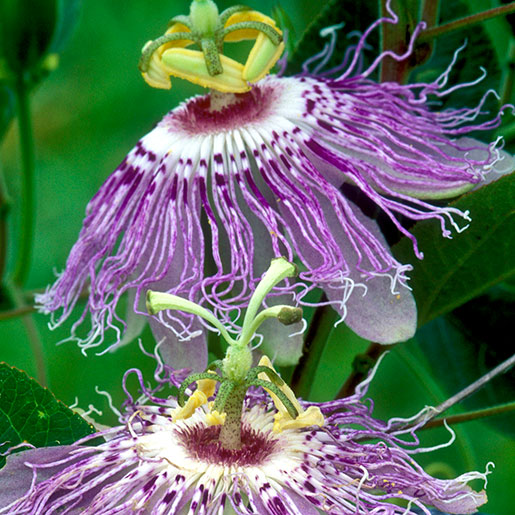Passionflower

Common Names: passionflower, maypop, apricot vine, maracuja, water lemon
Latin Names: Passiflora incarnata
Background
- Passionflower is a climbing vine that is native to the southeastern United States and Central and South America. The vine has white and purple flowers.
- Traditionally, passionflower has been used as a sedative. Sixteenth-century Spanish explorers in South America learned of passionflower. The plant was then brought to Europe, where it became widely cultivated and was introduced to European folk medicine.
- Today, passionflower is promoted as a dietary supplement for anxiety (including anxiety before surgery), sleep problems, stress, attention-deficit hyperactivity disorder (ADHD), pain, and other conditions.
How Much Do We Know?
- Passionflower’s effect on anxiety and other conditions hasn’t been studied extensively.
What Have We Learned?
- A small amount of research suggests that oral passionflower might help to reduce symptoms of anxiety and anxiety before a surgical or dental procedure, but conclusions are not definite. Passionflower might interact with some anesthesia drugs, so avoid its use before surgery unless recommended by a health care provider.
- A small amount of research suggests that oral passionflower might improve total sleep time in adults with insomnia, but its effects on the time it takes to fall asleep and stay asleep are mixed.
- There is not enough evidence to say whether passionflower is helpful for any other health conditions, including ADHD, congestive heart failure, menopausal symptoms, fibromyalgia, and stress.
What Do We Know About Safety?
- Passionflower is likely safe when it’s used as a flavoring in food.
- Passionflower may be safe when it’s taken as a tea for up to 7 nights, and the daily use of passionflower extract may be safe for up to 8 weeks. Possible side effects include drowsiness, dizziness, and confusion.
- Whether it’s safe to use passionflower topically (on skin) is not known.
- Taking passionflower when also receiving anesthesia or other medications used before and after surgery might slow down the nervous system too much. Talk to your health care provider if you are taking passionflower within 2 weeks of a scheduled surgery.
- Passionflower should not be used during pregnancy as it may induce uterine contractions and possibly lead to other problems. Little is known about whether it’s safe to use passionflower while breastfeeding.
Keep in Mind
- Take charge of your health—talk with your health care providers about any complementary health approaches you use. Together, you can make shared, well-informed decisions.
- If you take any type of medicine, talk with your health care provider before using passionflower or other herbal products; some herbs and medicines interact in harmful ways.
- Federal Regulation of Herbal Products
- Depending on what’s in them, how they’re intended to be used, and how they’re administered (orally or topically), herbal products are regulated in a variety of ways. Many herbal products intended for oral use are marketed as dietary supplements. The regulatory paths for making and distributing dietary supplements are different than those for drugs.
- Unlike drugs, dietary supplements are not approved by the U.S. Food and Drug Administration (FDA) before they are sold to the public. When public health concerns arise about the safety of a dietary supplement or an ingredient including an herb, the FDA can take action to protect the public. Manufacturers and distributors of supplements are responsible for evaluating the safety and labeling of their products before marketing to ensure that they meet all regulatory requirements.
NCCIH Clearinghouse
The NCCIH Clearinghouse provides information on NCCIH and complementary and integrative health approaches, including publications and searches of Federal databases of scientific and medical literature. The Clearinghouse does not provide medical advice, treatment recommendations, or referrals to practitioners.
Toll-free in the U.S.: 1-888-644-6226
Telecommunications relay service (TRS): 7-1-1
Website: https://www.nccih.nih.gov
Email: info@nccih.nih.gov (link sends email)
PubMed®
A service of the National Library of Medicine, PubMed® contains publication information and (in most cases) brief summaries of articles from scientific and medical journals. For guidance from NCCIH on using PubMed, see How To Find Information About Complementary Health Practices on PubMed.
Website: https://pubmed.ncbi.nlm.nih.gov/
Office of Dietary Supplements (ODS), National Institutes of Health (NIH)
ODS seeks to strengthen knowledge and understanding of dietary supplements by evaluating scientific information, supporting research, sharing research results, and educating the public. Its resources include publications (such as Dietary Supplements: What You Need To Know) and fact sheets on a variety of specific supplement ingredients and products (such as vitamin D and multivitamin/mineral supplements).
Website: https://ods.od.nih.gov
Email: ods@nih.gov (link sends email)
Key References
- Golsorkhi H, Qorbani M, Sabbaghzadegan S, et al. Herbal medicines in the treatment of children and adolescents with attention-deficit/hyperactivity disorder (ADHD): an updated systematic review of clinical trials. Avicenna Journal of Phytomedicine. 2023;13(4):338-353.
- Janda K, Wojtkowska K, Jakubczyk K, et al. Passiflora incarnata in neuropsychiatric disorders—a systematic review. Nutrients. 2020;12(12):3894.
- Miroddi M, Calapai G, Navarra M, et al. Passiflora incarnata L: ethnopharmacology, clinical application, safety and evaluation of clinical trials. Journal of Ethnopharmacology. 2013;150(3):791-804.
- Passionflower. NatMed Pro website. Accessed at naturalmedicines.therapeuticresearch.com on September 25, 2024. [Database subscription].
This publication is not copyrighted and is in the public domain. Duplication is encouraged.
NCCIH has provided this material for your information. It is not intended to substitute for the medical expertise and advice of your health care provider(s). We encourage you to discuss any decisions about treatment or care with your health care provider. The mention of any product, service, or therapy is not an endorsement by NCCIH.